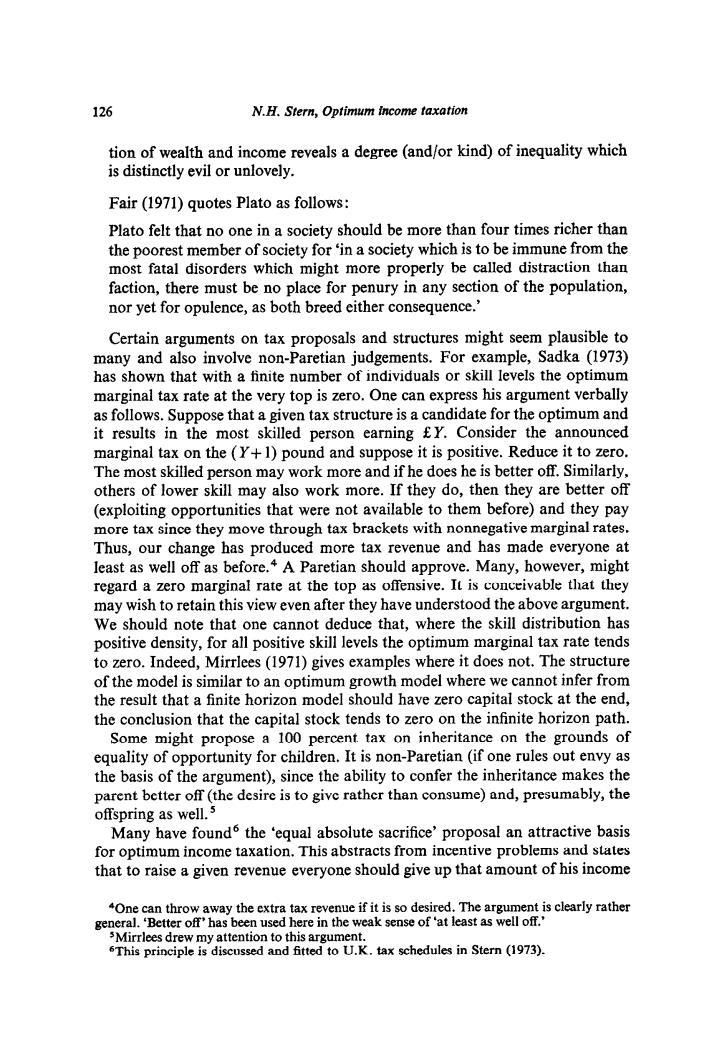正在加载图片...

126 N.H.Stern.Optimum income taxation tion of wealth and income reveals a degree(and/or kind)of inequality which is distinctly evil or unlovely. Fair(1971)quotes Plato as follows Plato felt thato should bemore than four times richer than the poor membe er of so ety fo rin a society which mune from the os fatal disorders which might more properly be faction,there must be no place for penury in any section of the population, nor yet for opulence,as both breed either consequence.' Certain arguments on tax prop osals and structures might seem plausible to e.Sadka (1973) eteto Oe in prmert many and a ements ampl has sh wn that levels the optin as follows.Suppose that a given tax structure is a candic late for the optimum and it results in the most skilled person earning Er.Consider the announced marginal tax on the (Y+1)pound and suppose it is positive.Reduce it to zero. The most skilled person may work more and if he does he is better off.Similarly, others of lower skill may also work more.If they do,then they are better off (exploiting opportunities e not available to them before)and they pay 0 ckets rginal rate Thus,our cha ange has produ ed m re tax revenue and ha as made everyon least as well off as before. A Paretian should approve Many,h er,might regard a zero marginal rate at the top as offensive.It is conceivable that they may wish to retain this view even after they have understood the above argument. We should note that one cannot deduce that,where the skill distribution has positive density,for all positive skill levels the optimum marginal tax rate tends to zero.Indeed,Mirrlees(1971)gives examples where it does not.The structure is s owth model where we cannot infer from e result that nilar to ar op th del should hay apital stock at the the conclusion that the capit Istock tends to on th infinite horizo Some might propose a 10 percent tax on ink on grounds equality of opportunity for children.It is non-Paretian(if one rules out envy as the basis of the argument).since the ability to confer the inheritance makes the parent better off(the desire is to give rather than consume)and,presumably,the offspring as well.5 Many have found6 the 'equal absolute sacrifice'proposal an attractive basis for optimum income taxation.This abstracts from incentive problems and states that to raise a given revenue everyone should give up that amount of his income 40 .K tax schedules in Stern (1973) 126 N.H. Stern, Optimum income taxation tion of wealth and income reveals a degree (and/or kind) of inequality which is distinctly evil or unlovely. Fair (1971) quotes Plato as follows: Plato felt that no one in a society should be more than four times richer than the poorest member of society for ‘in a society which is to be immune from the most fatal disorders which might more properly be called distraction than faction, there must be no place for penury in any section of the population, nor yet for opulence, as both breed either consequence.’ Certain arguments on tax proposals and structures might seem plausible to many and also involve non-Paretian judgements. For example, Sadka (1973) has shown that with a finite number of individuals or skill levels the optimum marginal tax rate at the very top is zero. One can express his argument verbally as follows. Suppose that a given tax structure is a candidate for the optimum and it results in the most skilled person earning EY. Consider the announced marginal tax on the (Y+ 1) pound and suppose it is positive. Reduce it to zero. The most skilled person may work more and if he does he is better off. Similarly, others of lower skill may also work more. If they do, then they are better off (exploiting opportunities that were not available to them before) and they pay more tax since they move through tax brackets with nonnegative marginal rates. Thus, our change has produced more tax revenue and has made everyone at least as well off as before.4 A Paretian should approve. Many, however, might regard a zero marginal rate at the top as offensive. It is conceivable that they may wish to retain this view even after they have understood the above argument. We should note that one cannot deduce that, where the skill distribution has positive density, for all positive skill levels the optimum marginal tax rate tends to zero. Indeed, Mirrlees (1971) gives examples where it does not. The structure of the model is similar to an optimum growth model where we cannot infer from the result that a finite horizon model should have zero capital stock at the end, the conclusion that the capital stock tends to zero on the infinite horizon path. Some might propose a 100 percent tax on inheritance on the grounds of equality of opportunity for children, It is non-Paretian (if one rules out envy as the basis of the argument), since the ability to confer the inheritance makes the parent better off (the desire is to give rather than consume) and, presumably, the offspring as well.’ Many have found6 the ‘equal absolute sacrifice’ proposal an attractive basis for optimum income taxation. This abstracts from incentive problems and states that to raise a given revenue everyone should give up that amount of his income 4One can throw away the extra tax revenue if it is so desired. The argument is clearly rather general. ‘Better off’ has been used here in the weak sense of ‘at least as well off.’ 5Mirrlees drew my attention to this argument. 6This principle is discussed and fitted to U.K. tax schedules in Stem (1973)